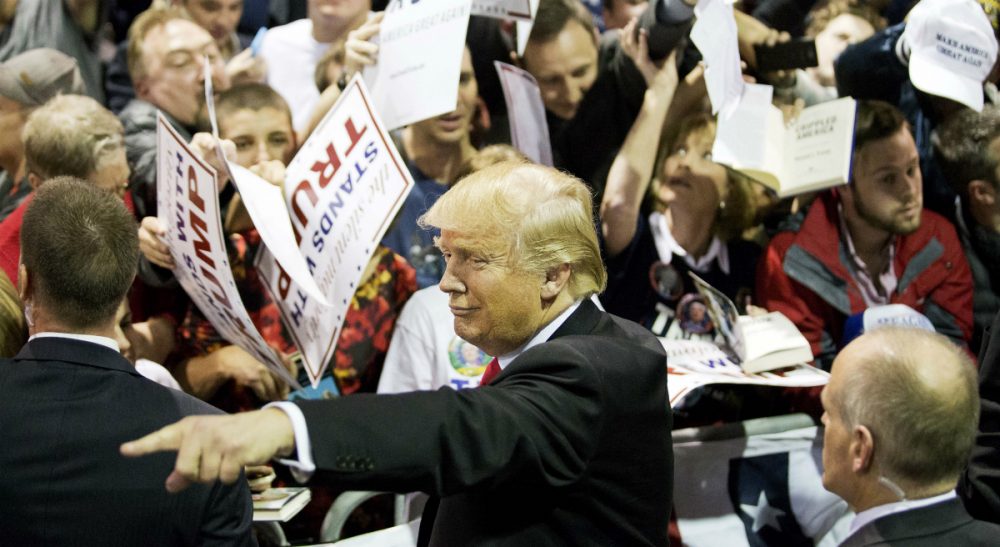Advertisement
Donald Trump's Secret Weapon

If this were a normal year, Donald Trump would have been obliterated in the South Carolina primary. Think: up to 65 percent of Republican voters there are evangelical; Trump is a thrice-married man with a tongue saltier than a New York soft pretzel. South Carolinians love George W. Bush; Trump called the ex-president a liar who misled us into invading Iraq. Perhaps one quarter of South Carolina’s GOP voters are veterans or active-duty military; Trump mocked John McCain for having the impertinence to get captured during the Vietnam War.
But perhaps you’ve noticed that 2016 is not normal. The Donald’s Palmetto State victory Saturday — following his respectable Iowa second, his decisive New Hampshire win, and his lead in every other state where someone’s thought to do a poll -- begs explanation. Yes, the “establishment” candidates are splintering the dump-Trump vote and collectively getting more votes than the New Yorker. Yet so far, he has secured an appreciable third of the primary vote in the conservative party, despite conservatism’s high priests excommunicating him for apostasy on protectionism, single-payer health insurance and other doctrines.
If this were a normal year, Donald Trump would have been obliterated in the South Carolina primary. ... But perhaps you’ve noticed that 2016 is not normal.
A new book by Boston University religion professor Stephen Prothero explains the seemingly inexplicable by mapping the enduring DNA of conservatism. "Why Liberals Win the Culture Wars (Even When They Lose Elections)" doesn’t find that essence in our modern litmus tests, like free trade or capitalism or state’s rights, for conservatives have taken all sides on those issues at different times. No, the consistent — and losing — proposition in conservative thinking, Prothero argues, is a cultural one. The right, he writes, always “has fought for a more restrictive understanding of the American family” and who may join in its rights.
He highlights five examples of failed conservative crusades to cut off that membership: the effort to deny Thomas Jefferson the presidency in 1800 because he wasn’t an orthodox Christian; anti-Catholicism and anti-Mormonism in the 19th century, which ended with WASP America’s acceptance of those religious newcomers and more religiously diverse nation; Prohibition, which ostensibly targeted alcohol but also reflected anxiety over who was drinking (a massive wave of immigrants) and where (blossoming cities, so alien to pastoral, small-town America); and contemporary conservative cultural defeats like legalized abortion and same-sex marriage.
Prothero is not the only student of the right to detect this enduring anxiety about the passing of a familiar way of life. In "The Reactionary Mind," political scientist Corey Robin traced conservatism from Edmund Burke’s warnings about the French Revolution to Sarah Palin’s screeds against, well, just about everything in Barack Obama’s America. Conservatism, Robin summarized, “is an ideology of reaction — originally against the French Revolution, more recently against the liberation movements of the sixties and seventies. … Conservatism really does speak to and for people who have lost something. It may be a landed estate or the privileges of white skin, the unquestioned authority of a husband or the untrammeled rights of a factory owner.”
No one will ever confuse Donald Trump with Edmund Burke. (For my money, Robin is too harsh on Burke, whose concerns about France were validated by the bloodbath of The Terror.) But viewed from this wide-angle perspective, Trump’s ascent makes sense: he’s channeling Republican voters’ fears that they’re losing the orderly world they’ve known.
Advertisement
“Trump’s famed ‘wall’ to keep Mexican immigrants out of the United States is a perfect
metaphor for cultural conservatism,” Prothero told me. That the people Trump would wall out, from Mexicans to Muslims, are typically non-white was bound to resonate in a country where some whites are unnerved by the looming loss of their majority status. Moreover, many Americans fear that immigrants take jobs from native-born citizens. (The number of illegal immigrants actually is down, but that’s no matter to people fueled by fear, not fact-checking. Polls in South Carolina found GOP voters there furious with both their government and their party's leaders.) Bashing these alleged job-stealing interlopers has voters without a college degree flocking under the billionaire’s banner, as they scrounge for decent-paying work in an economy increasingly hard on those with just a high school diploma.
...viewed from this wide-angle perspective, Trump’s ascent makes sense: he’s channeling Republican voters’ fears that they’re losing the orderly world they’ve known.
Trump isn’t the first White House wannabe to tap this us-versus-them meme. “Mr. Trump’s rhetoric resonates with a particular American political tradition,” Jacksonian democracy, wrote Steve Inskeep in The New York Times. Inskeep, an NPR host and author of a book about Andrew Jackson, says the seventh president’s greatest popularity emanated from the very regions whose residents love Trump: “While [his] fans are spread across the country, they are heavily concentrated in and near the Appalachian states — from Mississippi and Alabama all the way to western Pennsylvania and New York. The northwest corner of South Carolina is one of the most pro-Trump parts of the country.”
These voters don’t necessarily share the economic views of elite conservative pundits and politicians. Jackson himself was an economic ignoramus who famously killed the national bank, leaving generations more vulnerable in recessions until the creation of the Federal Reserve in the 20th century. But the populists who supported Old Hickory, and now back Trump, are cultural conservatives, terrified either by an economy that won’t support them, a country whose residents increasingly don’t look like them, or both.
That’s why Trump is winning. Having forced Jeb Bush from the race — the scion of the Republicans’ royal family, denied the throne — Trump’s success further whittled the opposition. One last man standing will have to emerge quickly, consolidating the anti-Trump vote, to have a shot at derailing a frontrunner who’s powered by historic cultural resentments.
